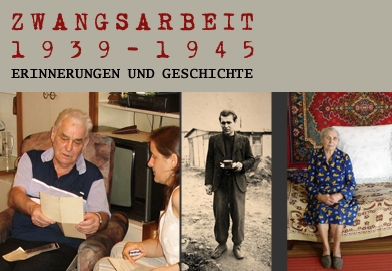Reappraisal of NS forced labor

© Screenshot from the website www.mit-stempel-und-unterschrift.de
© Screenshot from the website www.mit-stempel-und-unterschrift.de
In the German Reich, an estimated 13 million people had to do forced labor between 1939 and 1945; another 7 million people in the occupied and controlled territories. Forced labor was ubiquitous and took place almost everywhere. There was a method to exploitation and extermination through labor – in concentration and labor camps, in factory halls as well as on farms or in private households.
The EVZ Foundation was given the task in the Foundation Act and in its statutes of keeping the memory of National Socialist injustice alive for future generations. This is why it funds projects that research the history of NS forced labor.
© Stiftung EVZ, Sernau Heilmeyer Gestaltung
With the "MEMO Germany" studies, the Institute for Interdisciplinary Research on Conflict and Violence (IKG) of the Bielefeld University has been looking into the knowledge German citizens have about the period of National Socialism on behalf of the EVZ Foundation since 2018. The study shows, amongst other things, that knowledge of National Socialist history is waning amongst the younger generation.
To the studies (German, partly in English, Russian)
and the infographics
© Foto: FU Berlin/ Center für Digitale Systeme Cedis
National Socialist forced laborers tell their stories in the online archive "Forced Labour 1939-1945": Six hundred audio and video interviews with historical eyewitnesses from 26 countries are available for education and research. The cooperation partner is Freie Universität Berlin (FU).
The portal which is funded by the Foundation and created by the Federal Archives "Forced Labour in the National Socialist State" provides information about the history of forced labor and the material in regional archives. The website also includes a directory of places of confinement. In addition to the well-known locations of confinement such as concentration camps, there were also many places that were not considered as concentration camps in a formal sense, but where comparable conditions nevertheless prevailed. Under the Foundation Act, other places of imprisonment could therefore be treated as equivalent to concentration camps and recognized as "other places of confinement".
The database contains information about approximately 3,800 camps and places of confinement, the period of use as places of confinement for forced laborers, the geographical location as well as literature and source references.
Payments made by the EVZ Foundation and its partners to former forced laborers were preceded by an application procedure. Approximately 2.2 million people have applied for symbolic compensation.
In the course of the proceedings, the applicants substantiated their fates with numerous documents and descriptions. Some of the application documents have been transferred to national archive by partner organizations and are accessible to a limited degree. Here you will find a list of the archives and conditions under which the documents can be viewed.
The files created at the International Organisation for Migration (IOM) on compensation for forced laborers and indemnity for financial losses are held in the Federal Archives. Their use is governed by the provisions of the Law for the Conservation and Use of Federal Archival Materials (Federal Archives Act) of January 6, 1988 (Federal Law Gazette (BGBl) I P. 62), last amended by § 13 (2) of the Freedom of Information Act of September 5, 2005 (BGBl I P. 2722). Requests for use with details about the subject and purpose of use may be addressed to the Federal Archives.
www.bundesarchiv.de
The documents have been transferred to the State Archive.
Государственный архив Российской Федерации - ГАРФ (statearchive.ru)
Die Unterlagen wurden der Stiftung „Verständigung und Aussöhnung“ der Belarussischen Republik übergeben.
The application documents are accessible for research purposes with restrictions. They are kept in the Czech National Archives. Scientists who have an interest require approval from the Czech-German Fund for the Future.
Czech National Archives: www.mvcr.cz/archivy
German-Czech Future Fund: www.fondbudoucnosti.cz
Information about the documents may be obtained from the State Archival Service of Ukraine. Institutionally involved scientists can view the documents upon request.
www.archives.gov.ua/Archives
The "Foundation for Polish-German Reconciliation" was commissioned to set up an internet database containing information on the loss of persons and victims of National Socialist repression.
www.fpnp.pl
Consultant to the Board of Directors
Tel.: +49 (0)30 25 92 97-48
E-Mail: bock@stiftung-evz.de

